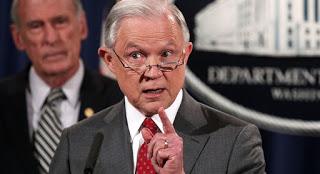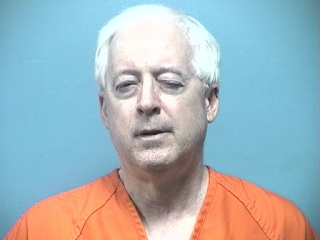
Jeff Sessions, at "leaks" press conference
(From politico.com)
Most reporting on the subject so far has treated Sessions' words as radical and overreaching. In fact, the notion isn't new at all in Alabama -- where Sessions served as U.S. attorney, attorney general, and U.S. senator over more than 35 years.
Less than four years ago, law-enforcement officers beat up a journalist in his own home near Birmingham, doused him with pepper spray, made an arrest (after threatening to break the journalist's arms) and hauled him to the Shelby County Jail for a five-month stay. Cops also made multiple attempts to arrest the journalist's wife. Chris Blevins, the primary Shelby County deputy involved in the arrest, never stated why he was on the journalist's property, never showed an arrest warrant, and never said he had an arrest warrant. A judge later ordered Blevins and a prosecutor to produce copies of any warrants in the case, and they responded that they didn't have any. The lack of any apparent warrant makes the case sound more like a kidnapping than an arrest.
How do I know so much about the case -- and the threats to press freedom in Jeff Sessions' Alabama? I was the journalist in question. I know what it's like to be stripped and placed in what might be called a "haz mat" shower to remove pepper spray before being issued jail garb. I know what it's like to have a fellow inmate jump about 25 feet to his death and land 10 feet or so from me. I know what sound a human head makes when it cracks on a concrete floor during a suicide. I know what it's like to see fights and near-fights break out regularly -- usually over issues related to use of a jail block's television or phones.
My experience has Jeff Sessions' fingerprints -- or those of his associates -- all over it. I know, from firsthand experience, that journalists had better take Sessions seriously when he threatens police action against them. Sessions has no respect for the rule of law, in general -- or the First Amendment in particular. And his focus on leaks appears mainly to be an effort to get back in Trump's good graces, after being the target of stinging criticism for recusing from the Russia investigation. In other words, Sessions is trying to save his own job by going after the press -- and he and Trump might figure this is their last, best hope to throw a wrench in Special Prosecutor Robert Mueller's investigation.
What is the primary lesson from my incarceration -- which has its own Wikipedia entry, by the way?
In early 2013, I wrote several unflattering stories about individuals connected to Jeff Sessions (See here, here, and here.) Next thing I knew, cops were swarming our property on a regular basis -- with one finally breaking in and arresting me.
Was Jeff Sessions directly involved in using the police state to attack a free press? We have two pending federal lawsuits designed to help answer that question -- and many others. But there is no question that Sessions was indirectly involved; at least five defendants in the two lawsuits -- Rob Riley, U.S. Judge Bill Pryor, U.S. Senator Luther Strange, political operative Jessica Medeiros Garrison, Trump "communications specialist" Cliff Sims and the Web site he founded, Yellowhammer News -- are closely aligned with Sessions. (Complaints in both lawsuits are embedded at the end of this post.)
Bottom line? Jeff Sessions and his acolytes see the threat of jail time as a legitimate way to control the press, and they have a history of using such tactics. I know, from personal experience.
In short, I was the only U.S. journalist to be incarcerated in 2013 (from Oct. 23, 2013, to March 26, 2014) -- the only journalist arrested in the western hemisphere that year. I'm the only U.S. journalist to be arrested since 2006 -- more than a decade -- and my incarceration is the third longest for a journalist in American history. Before me, was San Francisco-based free-lance videographer Joshua Wolf (2006), New York Times reporter Judith Miller (2005), and true-crime writer Vanessa Leggett (2001).
I am the only American journalist to be arrested in the 2000s for a case that had no criminal implications. Our research indicates I am the only journalist to be incarcerated because of an unlawful preliminary injunction, which has been an improper prior restraint under more than 200 years of First Amendment law. In other words, my case might represent the worst abuse of a journalist on American soil.
In essence, I was arrested because of this blog, Legal Schnauzer. I wasn't trying to protect sources; I wasn't ordered to turn over documents from my reporting about a possible crime. My reporting had nothing to do with national security. Those are the kinds of cases for which journalists lawfully can be hit with subpoenas and the threat of jail time.
In my case, someone decided this blog had to be shut down, and they figured the best way to do it was to arrest me -- and to try to arrest my wife, Carol, even though she had nothing to do with the blog at the time. (Note: Carol played a key role by managing to escape capture and get word out to the press about my arrest. She also kept the blog alive by writing regular reports about my situation. If she had not managed to do that, I might still be in jail, or more likely, be dead. If cops had abducted her, too, we both probably would be dead.)
When fellow inmates asked me why I was in jail -- and noted that I didn't look like most of the other prisoners -- I answered truthfully and directly: "I was arrested for blogging." That inevitably drew howls of laughter. Newbies often said, "Oh, you're the blogger guy. I've already heard about you. You're famous in here."
Some of the more thoughtful inmates would say something like, "Hey, wait, they can't do that. You can't arrest someone for blogging." The only response I could muster was, "Well, here I am."
How did I -- a guy with hardly even a traffic ticket on my record at the time -- wind up in jail? The short answer: I wrote accurate, hard-hitting posts about some of Jeff Sessions' cronies -- and I learned that you can go to jail for that in Alabama. (Note: I've been sued twice by Sessions' cronies; in both instances, my reporting was found -- as a matter of law -- to be neither false nor defamatory.)
Here is a little longer answer about how I wound up in jail:
* In January 2013, I began to publish a series of posts about an extramarital affair involving Homewood attorney Rob Riley (son of former GOP governor Bob Riley) and lobbyist Liberty Duke. The Rileys are closely aligned with Jeff Sessions;
* In July 2013, I began to publish a series of posts about an extramarital affair involving then Alabama Attorney General Luther Strange (he is now U.S. senator, replacing Jeff Sessions) and his one-time campaign manager, Jessica Medeiros Garrison. As noted, Strange replaced Sessions in the U.S. Senate, via appointment by former Gov. Robert "Luv Guv" Bentley, and now faces a special election, with the primaries on August 15. Garrison used to work for Sessions.
* In September 2013, I began to publish a series of posts about nude photographs of U.S. Circuit Judge Bill Pryor that had appeared in the 1990s at the badpuppy.com gay-porn Web site. Sessions and Pryor are so close that the AG pushed Trump to appoint Pryor to the U.S. Supreme Court seat that went to Neil Gorsuch.

My mugshot, as the only American ever arrested
for blogging.
The record indicates the lawsuit had no purpose other than to provide a (bogus) excuse to have me thrown in jail. Since Riley/Duke asked to have the record sealed -- and corrupt, retired Judge Claud Neilson granted anything they asked -- it's never been clear when their lawsuit actually was filed. But I did not become aware of it until after I had written about Bill Pryor and his ties to gay pornography. And Pryor is a long-time acolyte of . . . Jeff Sessions -- with Sessions hiring Pryor in the Alabama AG's office and pushing for Pryor to be appointed as his successor as AG.
At least one national-security expert clearly finds Sessions' language to be troubling. Politico's Kel McClanahan, executive director of a Maryland-based public interest law firm, wrote a piece titled "Jeff Sessions' Attack on the Media Is Worse Than You Think." McClanahan says Sessions is equating journalists with spies:
Don’t get me wrong; leaking classified information to the media is illegal, and it can result in harm to our national security. But recognizing that fact is a far cry from saying that leaking to a reporter is anything close to selling secrets to China: The two deserve to be treated differently. While it is true that the courts might decide to draw a line in the sand if the DOJ moves too far in this direction, they also might not, and even the courts’ hands are tied if new laws go into effect. Sessions is playing a long game here, and this is just him setting the public opinion foundation before he starts asking for more authorities to combat leaks. When he starts asking for those authorities, we the public need to be able to voice an informed opinion as to whether the threat of leakers is as great as he says it is, without confusing leakers with spies.
Do U.S. journalists grasp the threat that Jeff Sessions poses? This is from a report by Michael Calderone, at Huffington Post:
Journalists were alarmed Friday after U.S. Attorney General Jeff Sessions announced that the Department of Justice was revisiting guidelines for handling media subpoenas in leak investigations and said there needed to be limits on press freedom.
“Are you saying you will jail journalists, Mr. Attorney General?” a reporter asked as Sessions exited the room. “Do you plan to prosecute journalists?”
Sessions didn’t answer that question, or any, at the press conference. He “tells room of reporters he may make it easier to jail them if they don’t reveal sources,” MSNBC host and attorney Ari Melber tweeted, and “leaves without taking any press questions.”
Ari Melber provides an interesting tweet, but he hasn't lived in my shoes. I've been a journalist for 30-plus years in Jeff Sessions' Alabama, and I know what a toxic culture he and his brethren have created. They have built what I call "The New Confederacy," where the U.S. Constitution is ignored and "laws" are pulled out of thin air to favor white, conservative elites.
When a reporter asks, "Are you saying you will jail journalists, Mr. Attorney General?" I can provide this clear-eyed answer: "You can bet your press pass that's what he's saying. And you can bet he will try it, in an effort to protect himself and Trump from repercussions of the Russiagate scandal." Here's one of the central tenets of "The New Confederacy": White, conservative elites are not to be held accountable -- for anything.
That sounds warped, but hard-earned experience has taught me just how warped Jeff Sessions can be. No other journalist in the country has the perspective on Trump's AG that I do. And I absolutely expect him to try jailing journalists, whether there is any support for it, under the law, or not.
